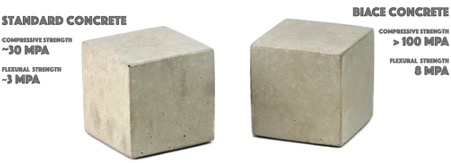Sustainable Concretes and Cements

Construction places great strain on our environment and it depletes resources. The production and consumption of natural resources has been the basis of the growth economy model through the last centuries. Enabling growth decoupled from the consumption of resources that currently powers that growth is essential to avoiding the worst of climate change and circularising the economy while still progressing the lives of the many.
Concrete is intrinsic to the development of our built environment, providing the substructure, structure and often the skin of contemporary architecture. Although relatively benign compared to other building materials, when rated on a per kg basis, we use considerable quantities of concrete in construction. With global population predicted to significantly increase and built floor area predicted to double by 2040 the production of concrete will increase with significant negative environmental impacts. Innovating low carbon concrete is essential. Through the EC funded, IMPRESS H2020 project, BIACE has developed (opens in a new window)low embodied concrete, with ultra high performance. The high strengths of this concrete can enable considerable reduction in the quantity of concrete used. Using this concrete BIACE has (opens in a new window)developed and (opens in a new window)tested precast cladding panels for building retrofit with 20mm wythes across 3m, floor to ceiling spans.
Further innovations are required, particularly with cement. Offsetting high embodied carbon cement using enhanced quantities of supplementary cementitious materials can significantly reduce the greenhouse gas emissions related to concrete. Offsetting high embodied carbon cement through the use of waste product or by-product materials can reduce the consumption of virgin materials. Ground granulated blast slag (GGBS) has been successfully used as a cement replacement for many of the world’s most sustainably constructed projects. However, its supplies are limited and it is not a long term solution. In the rush to retrofit our buildings almost 1.1 million tonnes of glazing from buildings are wasted every year. Glass bottles are however, one of the most recycled of materials. BIACE is working with Ecocem to investigate ground recycled glass as a cement replacement.
The group have also worked with (opens in a new window)biobased concretes including hempcrete and hemp-lime concretes. Oliver is a member of the (opens in a new window)HempHub at the UCD Earth Institute. Oliver and Richard are editors of a special issue journal in Buildings titled (opens in a new window)Sustainable Concrete Construction: Methods and Practices.